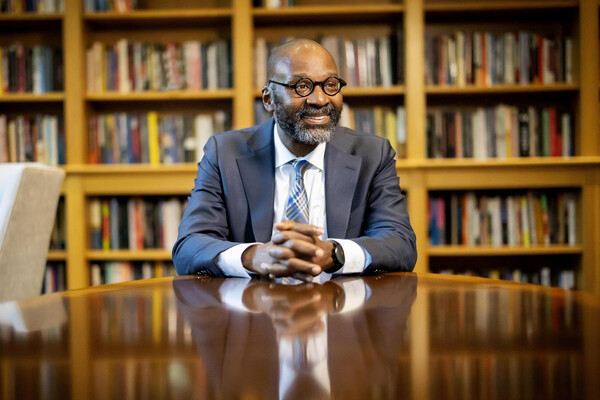
Griffin Pitt, right, works with two other student researchers to test the conductivity, total dissolved solids, salinity, and temperature of water below a sand dam in Kenya.
(Image: Courtesy of Griffin Pitt)
4 min. read

With a theme of “Fueling Business Growth Locally,” the eighth annual Penn Local Business Exchange united numerous stakeholders—local entrepreneurs, Penn suppliers and vendors, city officials, and Penn buyers—to strengthen relationships among Philadelphia’s business community, highlight Penn’s commitment to buying local, and discuss opportunities to drive economic growth in the region.
The Oct. 8 event, part of Penn’s Local Economic Opportunity Program, is designed to help buyers understand how they can support Philadelphia-based enterprises, said Mark Mills, chief procurement officer in the Division of Finance. It also provides a platform for Penn suppliers to gain vital exposure and access key resources for business growth.
Glenn Bryan, associate vice president of the Office of Government and Community Affairs, noted the University “has a long history of creating opportunities over the past five decades.” This legacy of local impact—accelerated by the 1986 launch of Penn’s Buy West Philadelphia Initiative—reverberates today as Penn spends nearly $500 million annually with regional-based enterprises. This includes more than $300 million with businesses in Philadelphia and over $100 million with West Philadelphia-based businesses.
Every one of these contracts is an opportunity to create jobs, to build wealth, and to open the next generation of entrepreneurs here in Philadelphia.
Executive Vice President Mark Dingfield
Joann Mitchell, senior vice president for institutional affairs, invited participants to learn from the expert perspectives of the day’s presenters before introducing the two keynote speakers: Provost John L. Jackson Jr. and executive vice president Mark Dingfield.
“When Philadelphia thrives and succeeds, Penn does too,” Jackson said. “In practical terms, that means when the University works with local businesses, we’re doing more than buying a product or a service: We’re investing in a system that creates jobs, that supports families, that promotes investments and entrepreneurship, and that genuinely grows the local economy.”
Dingfield cited two Penn suppliers, EMSCO Scientific and Win Win Coffee, as examples of the University’s mutually beneficial relationships with neighboring businesses.
“We’re not just focused on how much we’re spending, but how we’re spending, to ensure that purchasing, partnerships, [and] contracts are creating lasting value for our communities,” Dingfield said. “We recognize that every one of these contracts is an opportunity to create jobs, to build wealth, and to open the next generation of entrepreneurs here in Philadelphia.”
The forum platformed Philadelphia-based leaders in business, policy, and community development, with each panelist delivering a presentation in their area of expertise. Speakers included Jeff Hornstein, executive director of the Economy League of Greater Philadelphia; Della Clark, president of The Enterprise Center and partner with Innovate Capital Growth Fund; Michael Newmuis, director of Philadelphia 2026; and Michele Leff, principal and founder of 12th Street Catering.
Hornstein talked about the untapped potential for local procurement across industries, advising that sustainable growth occurs when capacity building is paired with substantial, long-term contracts. Clark discussed the differences in how capital flows to businesses in high-wealth versus low-wealth communities, emphasizing that data-driven financial preparation is key to driving local business growth. Work with Penn “because you want to grow, [because] you want to be a leader in this region and in this city,” Clark said.

Newmius previewed Philadelphia 2026’s plans to mark the country’s 250th birthday and promote Philadelphia’s profile as America’s birthplace, presenting opportunities for small businesses. Michele Leff shared stories of 12th Street Catering’s expansion and resilience over 40-plus years, including how Penn’s loyal support through the pandemic helped the business stay afloat.
“So much of what we've done has been with the support of Penn,” Leff said.
Following a Q&A with the panelists, manager of supplier engagement Vince Gumbs presented the fifth annual Penn Local Economic Impact Award to S. Shani Saunders and Brighid Dwyer, both representing the Office of Academic Excellence and Engagement (OAEE) in the School of Arts and Sciences.
After the forum, attendees gathered at the expo to network with 51 exhibitors promoting their products and services.
We feel like we’re part of the Penn team.
Gary Lindauer, Fidelity Graphics
At one booth, Hadid Thomas talked about Supra Office Solutions, a full-service office supply dealer that launched 15 years ago after its executives left a large company. The West Philadelphia-based business partners with W.B. Mason—an office supplies company that has existed for nearly 125 years—including a mentorship program that helps facilitate their growth. Thomas credits Penn Procurement Services for helping build this bridge.
“Penn has helped us expand our business [and] expand our revenue,” Thomas said.
Meanwhile, Gary Lindauer handed out flyers about Fidelity Graphics, which provides banners, posters, signage, and visual services to the University. Like many businesses in Philadelphia, the enterprise is multigenerational; his father launched Fidelity Graphics in 1969, and Lindauer took the reins in 1995. Penn being a “loyal customer for 44 years,” he said, has enabled the family business to expand their capabilities and helped power the company’s growth and success.
“We feel like we’re part of the Penn team,” Lindauer said.

Griffin Pitt, right, works with two other student researchers to test the conductivity, total dissolved solids, salinity, and temperature of water below a sand dam in Kenya.
(Image: Courtesy of Griffin Pitt)

Image: Andriy Onufriyenko via Getty Images

nocred

Provost John L. Jackson Jr.
nocred